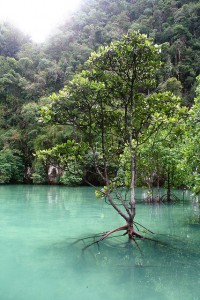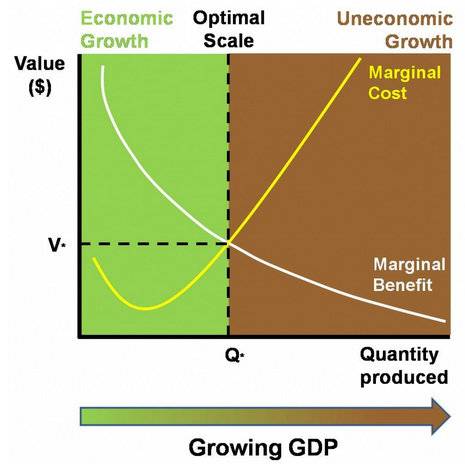
|
Mother Pelican
A Journal of Solidarity and Sustainability
Vol. 10, No. 6, June 2014
Luis T. Gutiérrez, Editor
|
|
|
|

|
|
|
The Hidden Costs of Cheater Economics
on Human Health & the Future of Life on Earth
Brent Blackwelder
Center for the Advancement of the Steady State Economy
This article was originally published in
The Daly News, 12 May 2014
under a Creative Commons License
The Center for the Advancement of the Steady State Economy (CASSE) is a research group on economic sustainability located in Arlington, Virginia, USA. The mission of CASSE is "to advance the steady state economy, with stabilized population and consumption, as a policy goal with widespread public support."
|
|
In a true cost steady state economy, the real costs of goods and services would not be disguised, hidden, or kept off the accounting ledger. The former head of Friends of the Earth England, Tony Juniper, makes a significant contribution to the discussion of a true cost economy in his new book What Has Nature Ever Done For US? How Money Really Does Grow on Trees.
Cheater economics enables polluting products to be sold cheaper than many clean products. Cheater economics includes subsidies for fossil fuels, pesticides, and toxic chemicals. Cheater economics tolerates pollution externalities, as economists have noted. For example, many damages caused by air pollution from coal-fired power plants are not incorporated into the price of coal but simply borne by the victims. The act of mountain top mining eliminates forests and streams while air pollution from burning coal results in loss of crops, damage to buildings, health problems, and mercury contamination of fisheries, etc.
Here is a sample of the astonishing set of ecological costs stemming from economic activities that damage or rearrange ecosystems that are presented in What Has Nature Ever Done For US?

Vulture in India. Photo Credit: Nagarjun Kandukuru
|
Vultures in India
India has almost lost its total population of 40 million vultures as a result of anti-inflammatory drugs injected into cattle and water buffalo. The vultures consumed the carcasses of these and other dead creatures and accumulated a fatal dosage. Now 12 million tonnes of animal flesh that vultures consumed annually is left rotting, fed upon by growing packs of dogs that have caused a massive outbreak of rabies among the human population. The annual medical costs exceed $30 billion as a result of the demise of the vulture population, which had previously provided free of charge essential garbage/carrion collection services.
Pollinators of Human Food Crops
About two thirds of the world’s food crops require animal pollination and one trillion dollars of the $3 trillion annual sales of agricultural products are dependent on animal pollinators such as honey bees and bumblebees. Certain pesticides are killing off these crucial pollinators. In the 1980s, extensive use of pesticides in part of Sichuan, China, eliminated the bee pollinators. Today in this region, about 40,000 people now have to pollinate apple and pear trees by hand.
The United Nations Food & Agriculture Organization (FAO) reports that in 146 countries, 90% of the food supply is provided by 100 crops. What is significant is that 71 of these 100 crops are pollinated primarily by wild bees. These crops include squashes, cherries, plums, cucumbers, strawberries, and pears.
Destruction of Ocean Fisheries via Subsidies
Ocean fisheries contribute $274 billion for global GDP but various countries provide $16 billion in subsidizing fishery harvesting practices that are highly damaging to fish stocks: i.e., the equivalent of killing the goose that laid the golden egg.

Mangrove in Thailand. Photo Credit: Jim Winstead
|
Mangrove Forest Loss & Coastal Flooding
One square kilometer of mangrove forest is worth between $200,000 and $900,000 annually. Destruction of coastal mangrove forests, as occurs with Asian shrimp farms, eliminates the storm protection barrier that is increasingly important in the face of sea level rise.
High Health Care Costs as Result of Destroying Natural Areas
To deal with the poor health of people in the polluted Gateshead area in Northeast England, a group of British public agencies in 2004 initiated a program of walks in a 360 hectare mixed forest zone. Tony Juniper reports that these walks were very effective in improving patients’ health and were far superior to the alternative of exercise in a gymnasium.
A growing body of evidence points to the health benefits from interactions with nature. Dr. William Bird, a British doctor, ran a diabetic clinic in the 1990s in Oxfordshire where he initiated a very successful program of health walks in natural areas. But the sad fact is that natural areas are declining in many urban areas. In Sheffield, England, the “roaming” range for children has declined over 5 generations from six miles when the great-grandparents were children to about 300 yards today for children. The health costs of destroying natural areas globally is simply a pollution externality for developers and extractors and is shoved off on the public.
Pharmaceuticals & the Loss of Tropical Rainforests
Experts estimate that between a quarter and a half of the $640 billion global pharmaceutical market is based on natural genetic diversity. Tropical rainforests contain a significant portion of the genetic diversity on earth, but despite the grave concerns about deforestation, an area the size of Germany or Montana was lost between 2000 and 2013.
To establish a true cost economy, we must get the ecological price right on products and services. The examples presented in Juniper’s book illustrate the extraordinarily large benefits provided by nature but neglected in today’s economic accounting. These compelling illustrations can be of great benefit in pushing toward a paradigm shift in current mainstream economic thinking. They are straightforward matter-of-fact descriptions of externalities that are undermining the life-support ecosystems of the Earth.
The Securities and Exchange Commission (SEC) should be requiring companies to disclose their pollution externalities annually so as to alert investors and the public to the true cost of their products. However, not only will a steady state economy depend on accounting for these costs and putting an end to cheater economics, but will also depend on changing our macroeconomic policy goal of continuous growth. Only then can we begin to stop the destruction of our planet and ensure our health and the environment are protected for generations to come.
|
ABOUT THE AUTHOR
Brent Blackwelder recently retired as the president of Friends of the Earth where he was renowned for speaking truth to power. He testified in front of the U.S. Congress on pressing environmental issues more than 100 times. He also was a founder of American Rivers, a top river-saving organization. As a leader in the effort to safeguard rivers, Brent helped expand the National Wild and Scenic Rivers System from eight rivers in 1973 to over 250 today. On the economics front, he initiated campaigns to reform the World Bank and succeeded in getting Congress to enact a series of significant reforms directing the Bank to pay more attention to the environment.
ABOUT THE CENTER FOR THE ADVANCEMENT OF THE STEADY STATE ECONOMY
The Center for the Advancement of the Steady State Economy (CASSE) is a research group on economic sustainability located in Arlington, Virginia, USA. The mission of CASSE is "to advance the steady state economy, with stabilized population and consumption, as a policy goal with widespread public support." The CASSE website provides many additional research resources on economic growth, degrowth, and post-growth. For example:
The following chart captures the basic rationales for the steady-state economy:

"Marginal cost refers to the cost of producing one more unit of a good or service. Marginal benefit is the benefit gained from one more unit. This graph shows the marginal costs and benefits of GDP growth. Costs tend to rise and benefits tend to decrease for each additional unit of growth. We should stop growing GDP, therefore, when marginal costs are exactly equal to marginal benefits. If costs are less than benefits, then GDP growth is economic (the green part of the graph). When costs rise above benefits, GDP growth is uneconomic (the brown part)."
|
Additional articles on the application of the fundamental steady-state economy concept to specifc issues can be found in the
The Daly News. The following is a list of recently published articles:
Steady Statesmanship Goes Global,
by Jon Rosales, The Daly News, 17 June 2013
Full Employment Versus Jobless Growth, Herman Daly, The Daly News, 15 July 2013
Entropia: Life Beyond Industrial Civilisation,
Samuel Alexander, The Daly News, 1 August 2013
Fixing Food and Farming with a True-Cost Economy, Brent Blackwelder, The Daly News, 6 August 2013
The End of the Age of Extraction, Brent Blackwelder, The Daly News, 2 September 2013.
Approaching a Steady State Economy, Part 1 — Getting Around, Rob Dietz, The Daly News, 9 September 2013
Approaching a Steady State Economy, Part 2 — Clean Clothes, Rob Dietz, The Daly News, 16 September 2013
Growth and Laissez-faire, Herman Daly, The Daly News, 23 September 2013.
Unlimited Competition Is Not Sustainable, Gunnar Rundgren, The Daly News, 30 September 2013.
Insanity Reigns at the World Bank, Brent Blackwelder, The Daly News, 14 October 2013.
A Question of Scarcity, Andrew Fanning, The Daly News, 21 October 2013.
How Many People Can a State Sustain?, George Plumb, The Daly News, 4 November 2013.
The Five Dumbest Things You’ll Hear About Sustainability, Brian Czech, The Daly News, 12 November 2013.
Top 5 Threats to the World’s Beaches (and a Systemic Solution), Brent Blackwelder, The Daly News, 18 November 2013.
The Hidden Door: Mindful Sufficiency as an Alternative to Extinction, Mark Burch, The Daly News, 16 December 2013.
Voluntary Simplicity and the Steady-State Economy, Mark Burch, The Daly News, 7 January 2014.
Toward a Finite-Planet Journalism, Eric Zencey, The Daly News, 3 February 2014.
Who's Going to Lead the Way to a Sustainable Economy?, by Rob Dietz, The Daly News, 24 February 2014.
An Economic Game Plan to Prevent Water Pollution, Brent Blackwelder, The Daly News, 17 March 2014.
What to Do When You Suspect We’re Headed for Collapse, Rob Dietz, The Daly News, 31 March 2014.
|
|Back to TITLE|
Page 1
Page 2
Page 3
Page 4
Page 5
Page 6
Page 7
Page 8
Page 9
Supplement 1
Supplement 2
Supplement 3
Supplement 4
Supplement 5
Supplement 6
PelicanWeb Home Page
|
|
|
|
"The world is charged with the grandeur of God!"
— Gerard Manley Hopkins (1844-1889)
|
|
Page 3
|
|
FREE SUBSCRIPTION
|
![[groups_small]](groups_small.gif)
|
Subscribe to the
Mother Pelican Journal
via the Solidarity-Sustainability Group
Enter your email address:
|
|
|
|